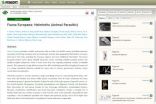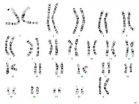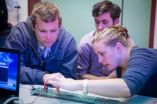(Press-News.org) COLUMBIA, Mo. – Research has shown that most 18-month-olds learn an average of two to five new words a day; however, little is known about how children process information to learn new words as they move through the preschool years. In a new study, a University of Missouri researcher has found that toddlers learn words differently as they age, and a limit exists as to how many words they can learn each day. These findings could help parents enhance their children's vocabularies and assist speech-language professionals in developing and refining interventions to help children with language delays.
"We found that babies' abilities to accurately guess the meaning of new words increases between 18 and 30 months of age, and by 24 to 36 months, toddlers are able to accurately guess the meanings of new words at a significantly higher level," said Judith Goodman, an associate professor in the MU School of Health Professions and chair of the Department of Communication Science and Disorders. "Interestingly, we observed that even from the time children mature from 18 to 30 months of age, the cues toddlers use to learn new words change."
In the study, researchers taught six new words to children, who ranged in age from 18 to 36 months, using three types of cues. The cues were presented alone or in pairs, and the researchers recorded the children's ability to accurately guess what the words meant.
"When children were presented with a new word and asked to choose between an item for which they already had a name and an unfamiliar object, they appropriately assigned the new word to the unfamiliar object, and this ability improved as children aged," Goodman said. "The toddlers' ability to infer a word's meaning from linguistic context, such as figuring out that a 'kiwi' must be a food item when they hear, 'Sammy eats the kiwi,' also improved as the children aged. However, using social cues, such as eye gaze, became less effective as the children matured. By 36 months of age, children were less likely to assume a word referred to the particular object a speaker was looking at – looking at a kiwi when teaching the child the word 'kiwi' – than younger children were."
Goodman also found that a limit exists as to how many words toddlers can retain. A day after the children learned the six words, the researchers tested whether the children remembered the words. The children better remembered the first three words they had learned the first day, Goodman said.
Children who are struggling with learning language may benefit from being presented with specific cues, Goodman said. Additionally, the research reinforces the importance of providing children with rich word-learning environments, in which toddlers are exposed to many words and are provided with a variety of cues to help them learn and remember those words and what they represent, Goodman said.
"When you're working with young children who are learning language, it's important to talk to them all the time and label everything in their environments," Goodman said. "At home, parents can name household items or foods the children are eating. If out on an excursion, such as a trip to the zoo, parents can label the animals they see."
INFORMATION:
The study, "The Type, but Not the Amount, of Information Available Influences Toddlers' Fast Mapping and Retention of New Words," was published in the American Journal of Speech-Language Pathology. Kathryn Brady, an assistant professor at Southern Illinois University Edwardsville, was the first author on the paper, which was based on her dissertation research completed at MU. The research was supported in part by the Student Research Grant in Early Childhood Language Acquisition from the American Speech-Language-Hearing Foundation.
Babies learn words differently as they age, researcher finds
Study findings can help speech therapists, parents broaden toddlers' vocabularies
2014-09-17
ELSE PRESS RELEASES FROM THIS DATE:
Contributions on Fauna Europaea: Data papers as innovative model on expert involvement
2014-09-17
Fauna Europaea started in 2000 as an EC-FP5 four-year project, delivering its first release in 2004. After 14 years of steady progress and successful participations in several EC projects, as a part of the EC-FP7 European Biodiversity Observation Network project (EU BON), to increase the general awareness of the work done by the contributors and to extend the general dissemination of the Fauna Europaea results, the Biodiversity Data Journal has applied its novel e-Publishing tools to prepare data papers for all 56 major taxonomic groups.
Fauna Europaea provides a public ...
Big surprises can come in small packages
2014-09-17
Astronomers using the NASA/ESA Hubble Space Telescope have found a monster lurking in a very unlikely place. New observations of the ultracompact dwarf galaxy M60-UCD1 have revealed a supermassive black hole at its heart, making this tiny galaxy the smallest ever found to host a supermassive black hole. This suggests that there may be many more supermassive black holes that we have missed, and tells us more about the formation of these incredibly dense galaxies. The results will be published in the journal Nature on 18 September 2014.
Lying about 50 million light-years ...
A link between Jacobsen syndrome and autism
2014-09-17
SAN DIEGO, Calif. (Sept. 17, 2014)— A rare genetic disorder known as Jacobsen syndrome has been linked with autism, according to a recent joint investigation by researchers at San Diego State University and the University of California, San Diego. In addition to suggesting better treatment options for people with Jacobsen syndrome, the finding also offers more clues into the genetic underpinnings of autism.
Jacobsen syndrome affects approximately 1 in 100,000 people, according to the National Institutes of Health. It occurs in a person when there is a deletion at the end ...
Lack of facial expression leads to perceptions of unhappiness, new OSU research shows
2014-09-17
CORVALLIS, Ore. – People with facial paralysis are perceived as being less happy simply because they can't communicate in the universal language of facial expression, a new study from an Oregon State University psychology professor shows.
The findings highlight the important role the face plays in everyday communication and indicates people may hold a prejudice against those with facial paralysis because of their disability, said Kathleen Bogart, an assistant professor of psychology in the College of Liberal Arts at Oregon State University.
"People are more wary and ...
Entrepreneurs aren't overconfident gamblers
2014-09-17
Leaving one's job to become an entrepreneur is inarguably risky. But it may not be the fear of risk that makes entrepreneurs more determined to succeed. A new study finds entrepreneurs are also concerned about what they might lose in the transition from steady employment to startup.
In Entrepreneurship and Loss-Aversion in a Winner-Take-All Society, Professor John Morgan at UC Berkeley's Haas School of Business and co-author Dana Sisak, assistant professor at the Erasmus University Rotterdam, focused on the powerful impact of loss aversion.
Loss aversion, or the fear ...
Oxides discovered by CCNY team could advance memory devices
2014-09-17
The quest for the ultimate memory device for computing may have just taken an encouraging step forward. Researchers at The City College of New York led by chemist Stephen O'Brien have discovered new complex oxides that exhibit both magnetic and ferroelectric properties.
Combining both properties is very exciting scientifically for the coupling that can occur between them and for the devices that might ultimately be designed, in logic circuits or spintronics. Combining these two properties in a single material, however, has proved difficult until now.
Using an innovative ...
Engineers develop algorithms to switch out and recharge battery modules in electric cars
2014-09-17
Imagine being able to switch out the batteries in electric cars just like you switch out batteries in a photo camera or flashlight. A team of engineers at the University of California, San Diego, are trying to accomplish just that, in partnership with a local San Diego engineering company.
They have developed smaller units within the battery, called modules, and a battery management system that will allow them to swap out and recharge the modules, rather than swapping out the whole battery, which is cumbersome and requires large, heavy equipment. They recently presented ...
US health system not properly designed to meet needs of patients nearing end of life, says IOM
2014-09-17
WASHINGTON -- The U.S. health care system is not properly designed to meet the needs of patients nearing the end of life and those of their families, and major changes to the system are necessary, says a new report from the Institute of Medicine. The 21-member committee that wrote the report envisioned an approach to end-of-life care that integrates traditional medical care and social services and that is high-quality, affordable, and sustainable. The committee called for more "advance care planning" for end-of-life by individuals, for improved training and credentialing ...
First blood test to diagnose depression in adults
2014-09-17
CHICAGO --- The first blood test to diagnose major depression in adults has been developed by Northwestern Medicine® scientists, a breakthrough approach that provides the first objective, scientific diagnosis for depression. The test identifies depression by measuring the levels of nine RNA blood markers. RNA molecules are the messengers that interpret the DNA genetic code and carry out its instructions.
The blood test also predicts who will benefit from cognitive behavioral therapy based on the behavior of some of the markers. This will provide the opportunity for more ...
Many throat cancer patients can skip neck surgery
2014-09-17
A new study shows that patients with human papillomavirus (HPV) – the same virus associated with both cervical and head and neck cancer – positive oropharyngeal cancer see significantly higher rates of complete response on a post-radiation neck dissection than those with HPV-negative oropharyngeal cancer. Fox Chase Cancer Center researchers presented the findings at the American Society for Radiation Oncology's 56th Annual Meeting on Wednesday, September 17.
"For patients that achieve a complete response, neck surgery is probably unnecessary," says Thomas J. Galloway, ...
LAST 30 PRESS RELEASES:
A genetic brake that forms our muscles
CHEST announces first class of certified critical care advanced practice providers awarded CCAPP Designation
Jeonbuk National University researchers develop an innovative prussian-blue based electrode for effective and efficient cesium removal
Self-organization of cell-sized chiral rotating actin rings driven by a chiral myosin
Report: US history polarizes generations, but has potential to unite
Tiny bubbles, big breakthrough: Cracking cancer’s “fortress”
A biological material that becomes stronger when wet could replace plastics
Glacial feast: Seals caught closer to glaciers had fuller stomachs
Get the picture? High-tech, low-cost lens focuses on global consumer markets
Antimicrobial resistance in foodborne bacteria remains a public health concern in Europe
Safer batteries for storing energy at massive scale
How can you rescue a “kidnapped” robot? A new AI system helps the robot regain its sense of location in dynamic, ever-changing environments
Brainwaves of mothers and children synchronize when playing together – even in an acquired language
A holiday to better recovery
Cal Poly’s fifth Climate Solutions Now conference to take place Feb. 23-27
Mask-wearing during COVID-19 linked to reduced air pollution–triggered heart attack risk in Japan
Achieving cross-coupling reactions of fatty amide reduction radicals via iridium-photorelay catalysis and other strategies
Shorter may be sweeter: Study finds 15-second health ads can curb junk food cravings
Family relationships identified in Stone Age graves on Gotland
Effectiveness of exercise to ease osteoarthritis symptoms likely minimal and transient
Cost of copper must rise double to meet basic copper needs
A gel for wounds that won’t heal
Iron, carbon, and the art of toxic cleanup
Organic soil amendments work together to help sandy soils hold water longer, study finds
Hidden carbon in mangrove soils may play a larger role in climate regulation than previously thought
Weight-loss wonder pills prompt scrutiny of key ingredient
Nonprofit leader Diane Dodge to receive 2026 Penn Nursing Renfield Foundation Award for Global Women’s Health
Maternal smoking during pregnancy may be linked to higher blood pressure in children, NIH study finds
New Lund model aims to shorten the path to life-saving cell and gene therapies
Researchers create ultra-stretchable, liquid-repellent materials via laser ablation
[Press-News.org] Babies learn words differently as they age, researcher findsStudy findings can help speech therapists, parents broaden toddlers' vocabularies





